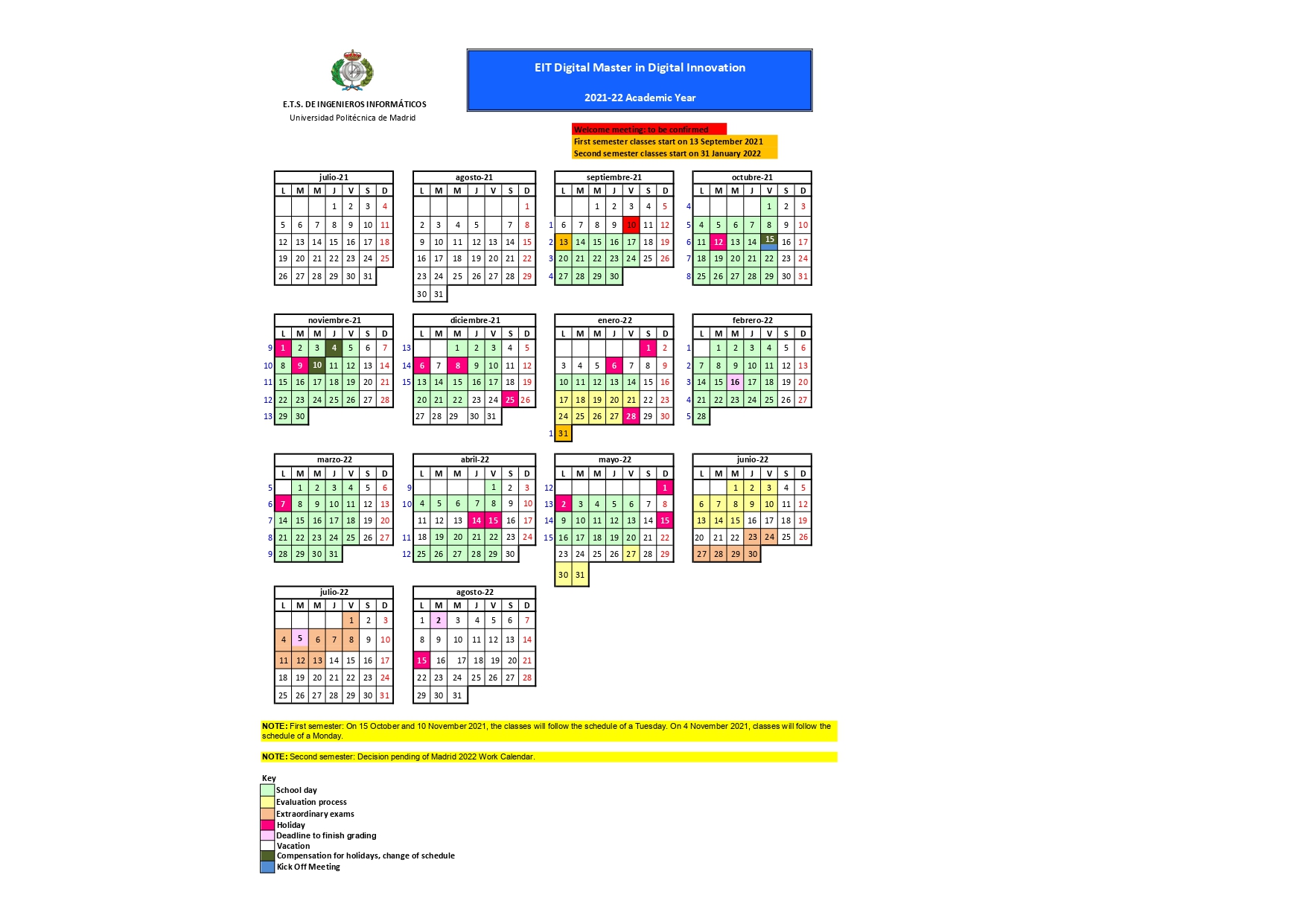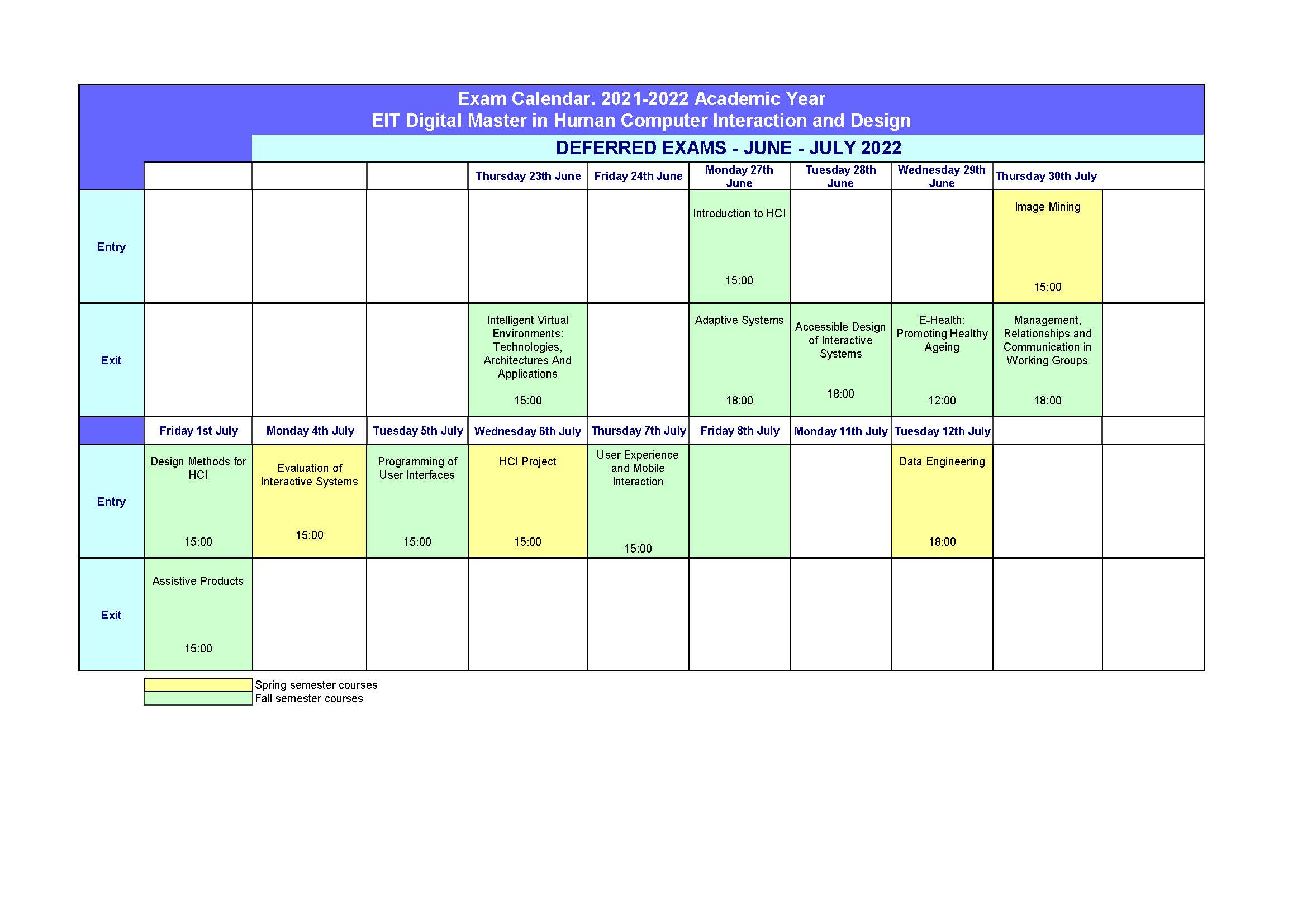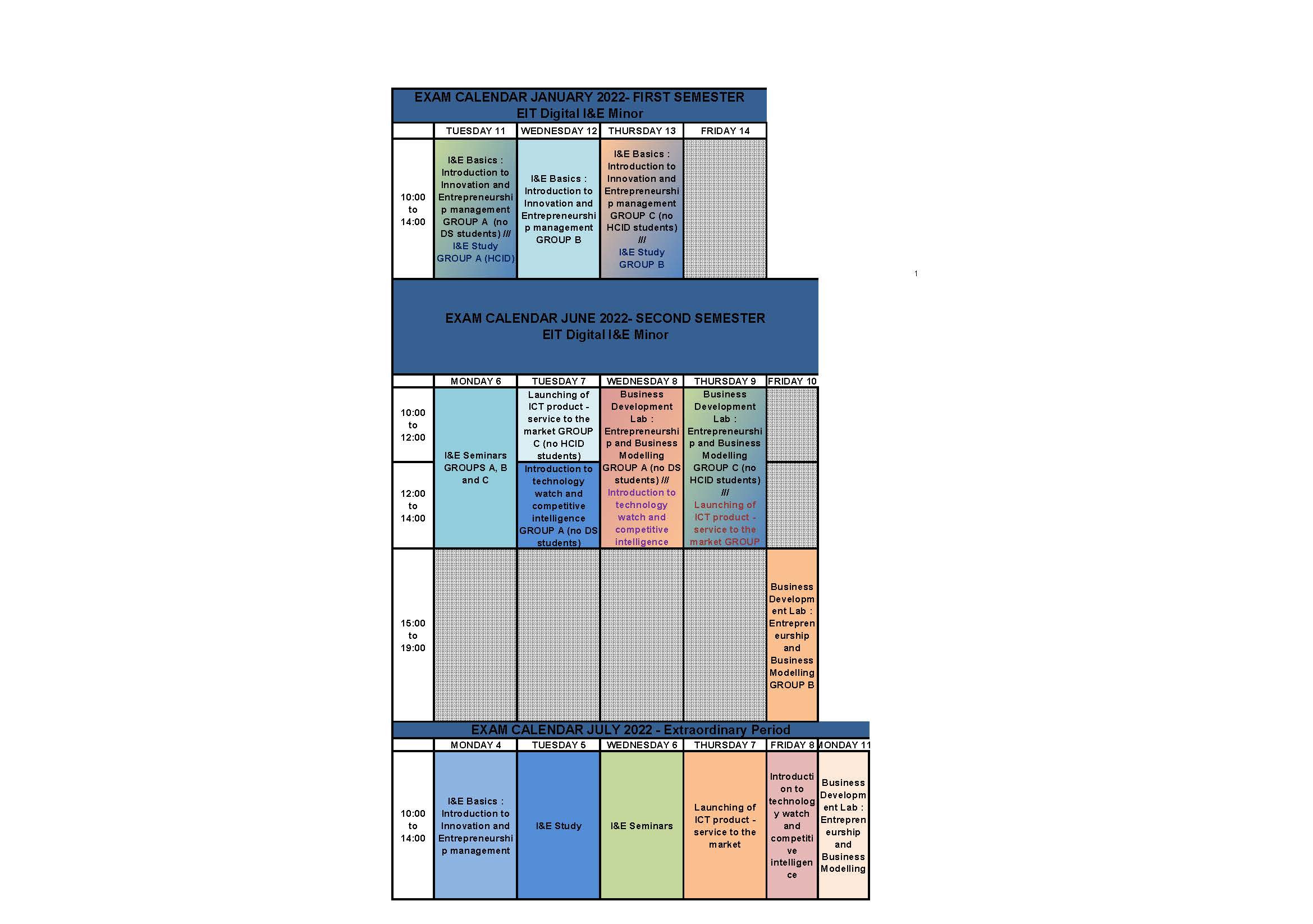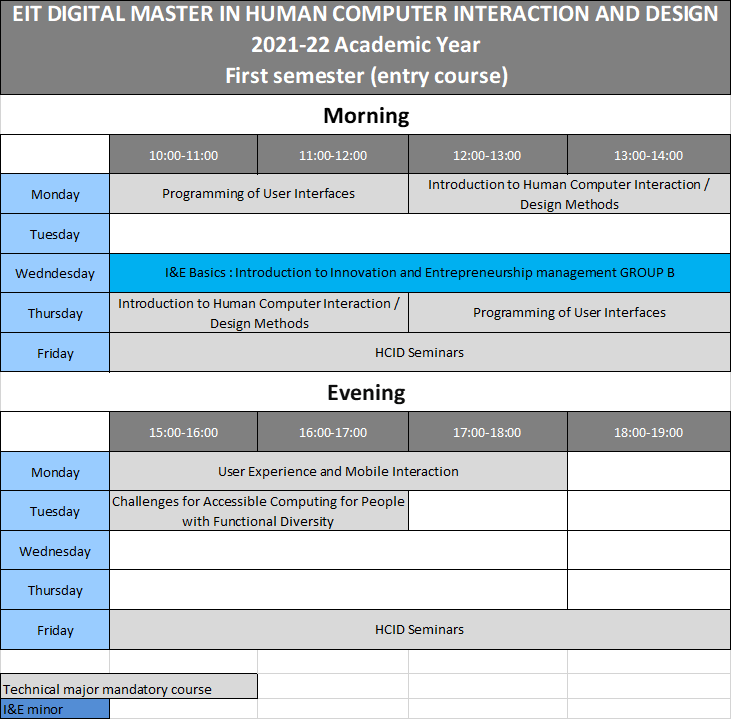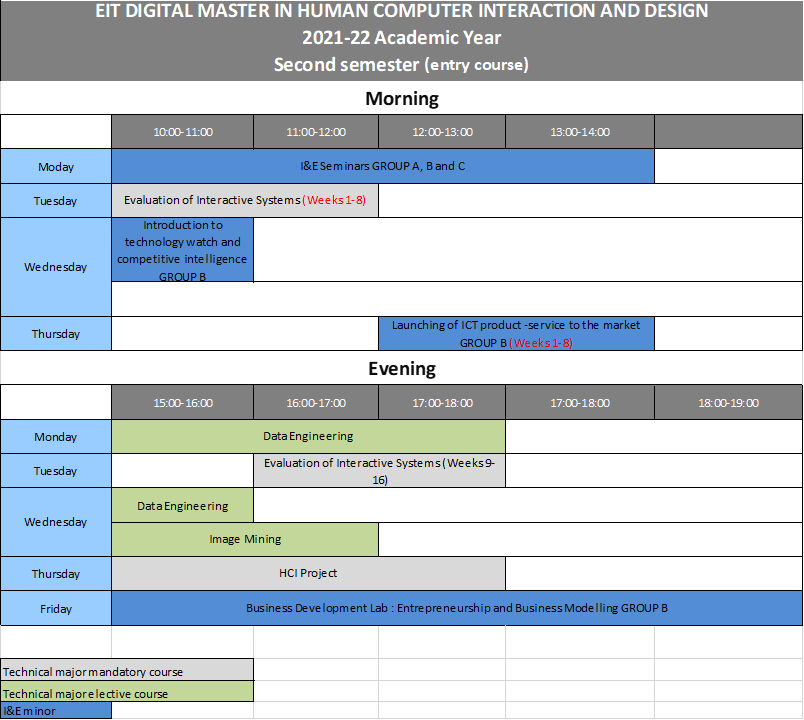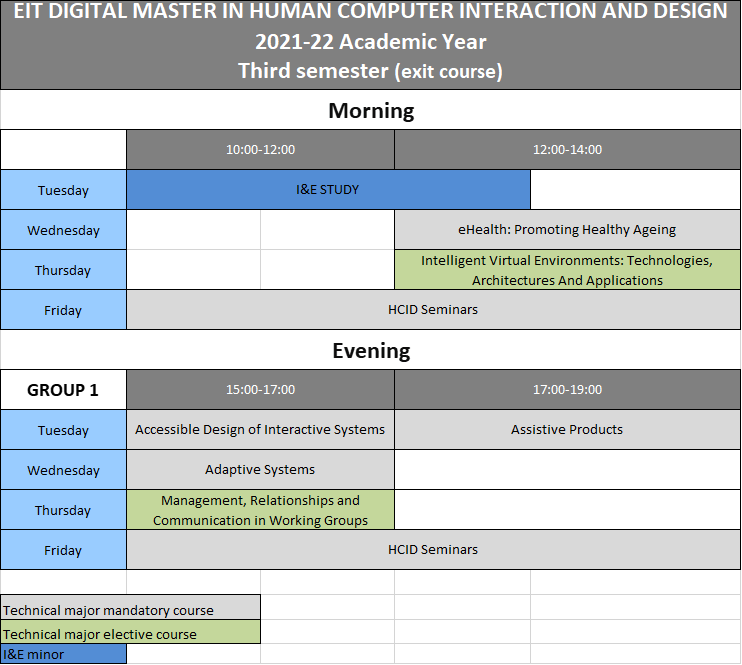
Introduction To Human-computer Interaction and Design
This course presents: first, an overview and introduction to the field of human-computer interaction and usability; second, an introduction to the methods to elicit user requirements and structure the design process to be usercentred; and third, the course will emphasize the importance of paying attention to user needs and cognitive
functioning in order to design usable systems. The course will also introduce visual design, heuristics, interaction methods and devices and specific interaction paradigms.
Faculty members with subject teaching role: Elena Villalba Mora (Subject coordinator), Cristian Moral Martos.
Design Methods for Human Computer Interaction
This course provides practical knowledge of how to use well-known and established HCI design methods as well as theoretical knowledge of how to think and reason on them during the design process. In this course we will approach interaction design from the perspective of user-centred design. Interaction design techniques will be presented to explore and refine the behaviour of products and services.
Faculty members with subject teaching role: Cristian Moral Martos (Subject coordinator), Elena Villalba Mora.
Programming of User Interfaces
This course introduces the fundamentals of programming techniques for interactive systems. Students will learn how to design and implement good user interfaces, how user interface systems work and integrate with operating systems. The course will focus on prototyping and development of simple graphical user interfaces (GUI) using rapid development tools such as graphical user interface layout editors combined with simple code to create functioning interfaces. The course also focuses on practice in the skills needed for development of user interfaces to be deployed on desktop, on the World Wide Web, and on mobile platforms.
Concretely, students will learn to use technologies that are used for desktop, web and mobile applications:
Faculty members with subject teaching role: Angel Lucas Gonzalez Martinez, Raul Alonso Calvo (Subject coordinator).
Challenges for Accessible Computing for People with Functional Diversity
This course provides a specialization about the accessibility of information and communication technologies (ICT) for persons with functional diversity (disability). It is mainly focused on current research issues in the field. The course will start with an introduction to basic ICT accessibiltiy concepts: functional diversity, design for all, legislation, standards and the assessment of the accessibility degree of ICT products and services. After that, the students will work on current challenges in the field, such as:
Faculty members with subject teaching role: Jose Luis Fuertes Castro (Subject coordinator), Loic Antonio Martinez Normand.
User Experience and Mobile Interaction
This course will be focused on designing mobile interactions with good user experience (UX). Contents of the course include: UX as a broadening of the scope of usability, design concepts, global user interfaces, designing for mobile experiences, interaction design patterns for mobile applications, mobile wireframes and prototypes and platform-specific design guidelines.
Faculty members with subject teaching role: Ricardo Imbert Paredes (Subject coordinator), Xavier Ferre Grau.
HCID Seminars I
The course includes a set of seminars to deeply work around concrete edge topics related to User Experience (UX) in general; and Adaptive and Accessible Interaction in particular. The seminars can be of two types: visits held by external institutions and master classes taught by experts. In the seminars, students will work on topics like Analysis and specification of the context of use, Design of solutions for people with disabilities in their daily life, Evaluation of the usability and accessibility of specific systems, Ubiquitous Computing, Brain-Computer Interaction, or Data Mining or eHealth.
Faculty members with subject teaching role: Cristian Moral Martos (Subject coordinator), Loic Antonio Martinez
Normand.
Introduction to Innovation and Entrepreneurship Management
Introduction to innovation and entrepreneurship management: definition, models and processes of innovation. Organizational structures, corporate innovation, protection of technology, digital economy. Innovation projects management, risks of international projects. Market. Financial support for innovation. Evolution of technology.
Faculty members with subject teaching role: Pilar Quevedo Cano (Subject coordinator), Roberto Martinez Gamero.
Introduction To Technology Watch And Competitive Intelligence
After presenting the basic elements of innovation management, students will receive detailed information on tools and procedures related to the identification, selection and eventually absorption/adaptation of technologies, which could be useful for the selection of the technologies required to implement their own business projects in the Master Degree.
Faculty members with subject teaching role: Pilar Quevedo Cano (Subject coordinator).
Evaluation of Interactive Systems
This course teaches methods to perform usability evaluation, experimental design and to statistically analyse the results. Different evaluation methods will be introduced for different tasks, user groups, and performed in a lab environment as well as in field.
Faculty members with subject teaching role: Elena Villalba Mora (Subject coordinator), Cristian Moral Martos, Óscar Dieste.
HCI Project
This course is a multi-disciplinary project course with user cooperation in all phases of the project, from a general described theme to a specific and finished result. The project will be reported in different media. The project is expected to be integrated with the Business Development Lab course (part of the I&E minor).
The students will be assigned to teams. Each team will chose a subject for developing a project of an interactive system, applying the user-centred design process stages, under the supervision of one of the professors of the course. The teams will present in the classroom the status of their projects at different stages of the design process.
Faculty members with subject teaching role: Loïc Martínez Normand (Subject coordinator), Elena Villalba Mora.
Image Mining
About 80% of the data generated worldwide is visual information: images and videos. To capitalize on the value of this enormous amount of information, various technologies are needed to organize, store, retrieve and interpret this information automatically.
In this scenario, image mining provides the framework and tools needed to extract the implicit knowledge, useful data and relationship between image data from the images stored in large image databases.
Since the course does not presuppose prior knowledge of image processing, the first part of the course focuses on providing students with the concepts and methods needed to understand how to structure the information contained in images, which is the first step in starting an image mining project..
Faculty members with subject teaching role: Angel Mario Garcia Pedrero (Subject coordinator), Consuelo Gonzalo Martin.
Data Engineering
The course is mainly dedicated to the improvement of the development of software engineering projects by means of Data Mining.
The course is very interactive, with the development of many short projects and exposition at class. Learning by doing, using the IBM SPSS Modeler tool.
Topics:
Techniques:
Faculty members with subject teaching role: Fco.javier Segovia Perez (Subject coordinator), Ernestina Menasalvas Ruiz.
Entrepreneurship and Business Modelling
This course corresponds to the first part of the Business Development labs I&E (8 ECTS) proposed for the I&E minor and it is offered in the second semester of the 1st year. The objective is to help students in the development of an innovative digital product or service.
The course is organised during one month with 10 hours lecturing, 20 hours for individual work and 5 hours for group discussions. Individual work is mentored. .
Faculty members with subject teaching role: Aristides Senra Diaz (Subject coordinator), Federico Garcia-Linares Fontes.
I&E Seminars
Several elective I&E seminars/courses will be offered covering advanced topics on any of the following: business development, business finance, marketing, innovation management, intellectual property and market research..
Faculty members with subject teaching role: Fco. Javier Segovia Perez (Subject coordinator).
Summer School
Digital-based Services Creation
Launching of ICT Product/services to the Market
Faculty members with subject teaching role: Federico Garcia-Linares Fontes (Subject coordinator), Aristides Senra Diaz.
Accessible design of Interactive Systems
This course provides a specialization about the accessibility of information and communication technologies (ICT) for persons with functional diversity (disability). It is mainly focused on current research issues in the field.
The course will start with an introduction to basic ICT accessibiltiy concepts: functional diversity, design for all, legislation, standards and the assessment of the accessibility degree of ICT products and services.
Faculty members with subject teaching role: Jose Luis Fuertes Castro (Subject coordinator), Loic Antonio Martinez Normand.
Adaptive systems
Interaction design methods focused on providing the same content to all users offer limited possibilities in addressing the specific needs and requirements of different types of users. Therefore, an essential feature of certain interactive applications should be their ability to provide some form of automatic adaptation and customization. The main objective of this course is to achieve an understanding of the models, techniques and architectures necessary to make a computer application dynamically adapt to the specific needs and requirements of different types of users at all times.
Adaptive systems maintain a model of the interests, preferences and / or knowledge of each individual user, and use this model to adapt the behavior of the systems to the needs of that user.
This course will cover the main components of the user model in the context of adaptive systems. And within the adaptive systems, the personalized search systems on the Web will be addressed first and it will be explained how these systems are supported by the user model.
Recommendation systems have become essential tools in many areas of application, because they help alleviate information overload as they select the most appropriate content for each user based on their preferences and / or interests. In this sense, these types of systems help users in decision-making by providing personalized services and help information providers and companies to serve customers more effectively.
In this course, the general characteristics of the recommendation systems will be explained and a classification of these systems will be presented according to the type of techniques they use to generate the recommendations.
According to this classification, we will distinguish between content-based, collaborative filtering, and hybrid recommenders. Following this, an introduction will be given to the main techniques on which each of these groups of recommenders are based, highlighting the strengths and weaknesses of each group.
By designing and testing improved forms of interactive collaboration between humans and digital assistants, we can enable decision-making processes that better leverage the strengths of both partners. To make the interaction between them more fruitful, we can resort to dialogue systems based on natural language processing techniques.
Therefore, one of the topics of the course will be devoted to dialogue systems taking as a case study the cognitive service of IBM, Watson Assistant. Likewise, the problem of designing dialogue systems that are truly adaptive to the user and not mere natural language interfaces for a database will be addressed.
E-learning is a traditional domain for the application of personalization and adaptation technologies. One of the main objectives of these applications is to improve the effectiveness and efficiency of learning experiences. The last topic of the course will be about adaptive e-learning systems paying special attention to intelligent tutoring systems..
Faculty members with subject teaching role: Jaime Ramirez Rodriguez (Subject coordinator), Angelica De Antonio Jimenez.
Assistive Products
An assistive product is any product (including devices, equipment, instruments and software), especially produced or generally available, used by or for persons with disability for participation; to protect, support, train, measure or substitute for body functions, structures and activities; or to prevent impairments, activity limitations or participation restrictions. This course will first describe the assistive products that are normally used by persons with disabilities to use ICT products and services. It will then explain how ICT can interoperate with assistive products through the use of accessibility APIs of operating systems.
Faculty members with subject teaching role: Loic Antonio Martinez Normand (Subject coordinator), Jose Luis Fuertes Castro.
E-health: Promoting healthy ageing
The main focus of this subject is achieving an understanding of the necessary models, techniques and architectures that allow the development of interactive systems in the E-health domain. Topics to be covered include eHealth, eInclusion, co-production of health, empowerment, social innovation, social networks, serious games, and participation in society..
Faculty members with subject teaching role: Elena Villalba Mora (Subject coordinator), Cristian Moral Martos.
HCID Seminars II
The course includes a set of seminars to deeply work around concrete edge topics related to User Experience (UX) in general; and Adaptive and Accessible Interaction in particular.
The seminars can be of two types: visits held by external institutions and master classes taught by experts.
In the seminars, students will work on topics like Analysis and specification of the context of use, Design of solutions for people with disabilities in their daily life, Evaluation of the usability and accessibility of specific systems, Ubiquitous Computing, Brain-Computer Interaction, or Data Mining or eHealth.
Faculty members with subject teaching role: Cristian Moral Martos (Subject coordinator), Loic Antonio Martinez Normand.
Management, Relationships and Communication in Working Groups
Outline
Within the sphere of business, research or development and cooperation, finishing a project successfully depends on several factors. So does efficiency and effectiveness of the project. One of the most important of these factors is the human factor. Communication and management skills, together with the relationship between workgroup members are some of the deciding elements for developing a well-done job. Social skills are a key aspect during the development of a task in an environment where the different members don’t necessarily need to share the same characteristics.
Learning Goals
This course studies in depth the factors that determine the human skills for managing and administering a work group, aside from its supervision and smooth running assurance. It will emphasize the importance of communication (motivational, negotiation) and self-control processes, as well as the methods connected to the decision-making processes and team management abilities (leadership, conflict mediation, etc.).
Faculty members with subject teaching role: Susana Muñoz Hernandez (Subject coordinator), Santiago Eibe Garcia.
Intelligent Virtual Environments: Technologies, Architectures and Applications
This subject allows deepening into Intelligent Virtual Environments as a specific kind of computer systems:
The main research and development trends in the area of Intelligent Virtual Environments will be presented, with a special focus on the peculiarities of 3D interaction, the challenges associated with the design of intelligent virtual agents, and educational applications.
Faculty members with subject teaching role: Angelica De Antonio Jimenez (Subject coordinator), Jaime Ramirez Rodriguez.
I&E Study
The second semester of the Exit year is devoted to a 30 credits Master Thesis held in an innovative entity.
